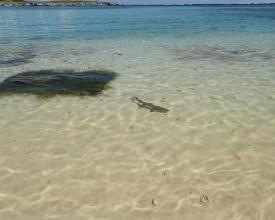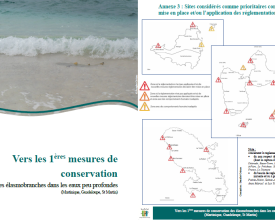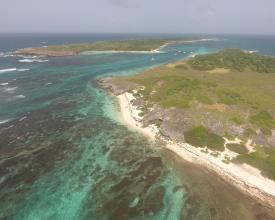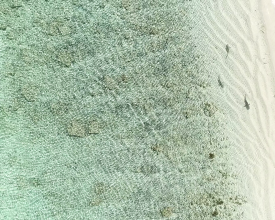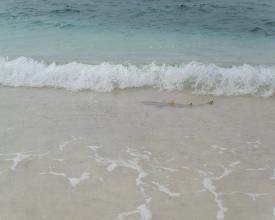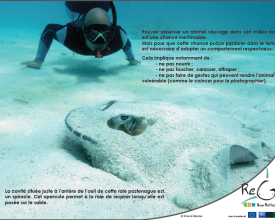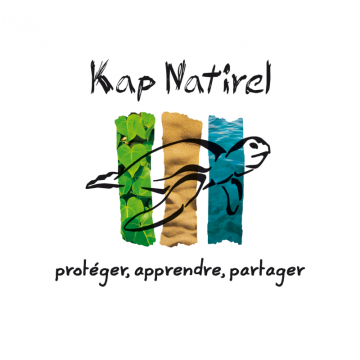
Toward conservation of coastal sharks in the French West Indies
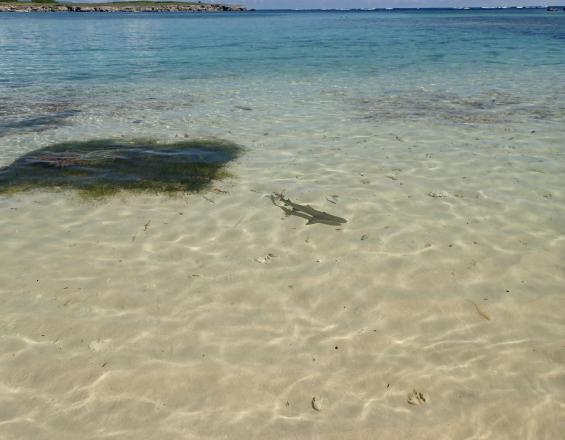
The French West Indies have a rich but fragile diversity of sharks and rays. With more than 50 species identified in the territorial waters, more than 30% are on the Red List of endangered species and 30%, near threatened, are likely to join this list soon.
The main goal of this project is to promote the implementation of management measures adapted to local populations of sharks and rays and to the local context of the French West Indies. In other words, to conciliate the protection of sharks and the use of the sea by humans.
For this, complementary methods are used for identify i) the species present in the coastal waters; ii) the coastal areas frequented by these species; iii) the main threats to these species in the identified areas. Including aerial survey and participatory sciences.
Contexte
Défis à relever
- Working on animals that frighten the population.
- Inform the public that there are baby sharks on the beaches where they swim and they need need to be protected.
- Regulations for the professional use of drones are restrictive.
- Restrictive weather conditions (wind too strong to use the drone).
- Low awareness of the general public on the species and its conservation.
Emplacement
Traiter
Résumé du processus
The French West Indies are home to several coastal shark nurseries. These areas are essential for the survival of these species. Unfortunately, the coastal zone is the area most impacted in our islands, in particular by pollution and nautical activities (such as fishing). The French West Indies have a role in the conservation of these species. It is important to act today.
To protect, it is necessary to know, in order to adapt the conservation measures and to propose the most effective actions. But conservation measures (such as fishing regulations) will be useless if the public is not engaged in this cause. We need to protect, learn and share.
Blocs de construction
Protéger /To protect
With the presence of critically endangered species (i.e. Caribbean numbfish, Narcine bancroftii), of endemic Caribbean species (i.e. the Caribbean reef shark, Carcharhinus perezi), and of many nurseries and breeding areas, the French West Indies have an important role in the conservation of shark and ray populations.
However, the protection of species that have a negative image remains a challenge, even more so due to the accidents that take place each year on the French island of La Reunion.
This project aims to propose the first measures for the conservation of sharks and rays: adaptation of fishing regulations, development of sustainable tourism practices, ect.
Facteurs favorables
- Adapted measures for sharks and rays populations.
- Stakeholder and managers involved.
Leçon apprise
- The importance of involving stakeholders.
- The need to raise awarness the public but also the stakeholders and state officials.
Apprendre / To learn
To protect, we need knowledge.
- What shark and ray species are present in the shallow waters of the French West Indies?
- When are these species present?
- Are they present on all the islands?
- What are the potential local threats to their populations?
- Are they in contact with human activities?
With so many questions in need of an answers, we came up with two main methods to collect the necesarry knowledge:
- Scientific monitoring based on aerial surveys. The shallow waters of the French West Indies were explored with a drone. This method makes it possible to identify the species present and count the number of individuals which frequent the shallow waters.
- Aquisition and valorisation of sea user's knowledge. Who is best placed to know the sea? The local users! Fishermen, divers, swimmers use the sea every day. Participatory science was used to record sightings of sharks and rays. The collected data made it possible to produce distribution maps for each species and to collect information about shark and ray interactions with humain activities.
Facteurs favorables
- Stakeholders and managers involvement.
- Communication.
Leçon apprise
The difficulty of using participatory sciences.
Partager / To share
Communication and raising awareness are the pillars of environmental protection.
Laws are an important factor for environmental protection, but it is the will of the public that will make the difference. It is important to raise awareness of the richness of our territories, but also of their fragility. We need to realize that it is through our daily actions that we can make a difference. For example, if a consumer creates a demand, the fisherman responds to this demand.
To share and raise awareness, an exhibition will soon be set up on each island of the French West Indies. The objective will be to present the diversity and the fragility of the shark and ray populations that frequent the shallow waters and to present good practices.
Facteurs favorables
- Attractive supports.
- Surprising information about sharks and rays.
- Supports adapted to the local context.
- Various communication methods to reach different kind of public.
Leçon apprise
- The public wants to discover and learn.
Impacts
The positive impacts of this project follow the baseline of Kap Natirel : "To protect, to learn, to share".
To protect:
This project allowed us to identify the shark and ray species which frequent the shallow coastal waters of the French West Indies. The initiative developed distribution maps and identified the main threats to shark and ray nursery areas, information that will be useful for the managers of beneficiary sites.
The data collected made it possible to support the recommendations in favor of prohibitiing shark and ray fishing for recreational purposes.
To learn:
This projet allowed the implementation of a long-terme monitoring of coastal nurseries in the French West Indies in order to evaluate population state in the time. Including a training for a monitoring team and the acquirement of necessary equipment (including a drone).
To share:
This project also allowed to create the first exhibition to inform and raise awareness for various public over the next few years and throughout the French West Antilles.
Bénéficiaires
- Parc National de Guadeloupe.
- Réserves Naturelles de la Désirade.
- Parc Naturel Marin de Martinique.
- Réserve Naturelle de St. Martin.
Objectifs de développement durable
Histoire
Kap Natirel (Karaib Associasion pou Pwoteksion a la Nati) is a small NGO based on the Guadeloupean Archipelago. In charge of the Sharks Network of the French West Indies (Reguar), it carries out several actions in favor of shark conservation.
Their main goal is to promote the implementation of management measures adapted to local populations of sharks and rays and to the local context of the French West Indies. In other words, to conciliate the protection of sharks and the use of the sea by humans.
With the support of the European Union's the BEST 2.0 program, Kap Natirel is working on a specific project for shallow waters, a big challenge because it's where most of the interaction between sharks and human activities occurs.
Discover this project with the Kap Natirel baseline «Protéger, apprendre, partager» (to protect, to learn, to share).
